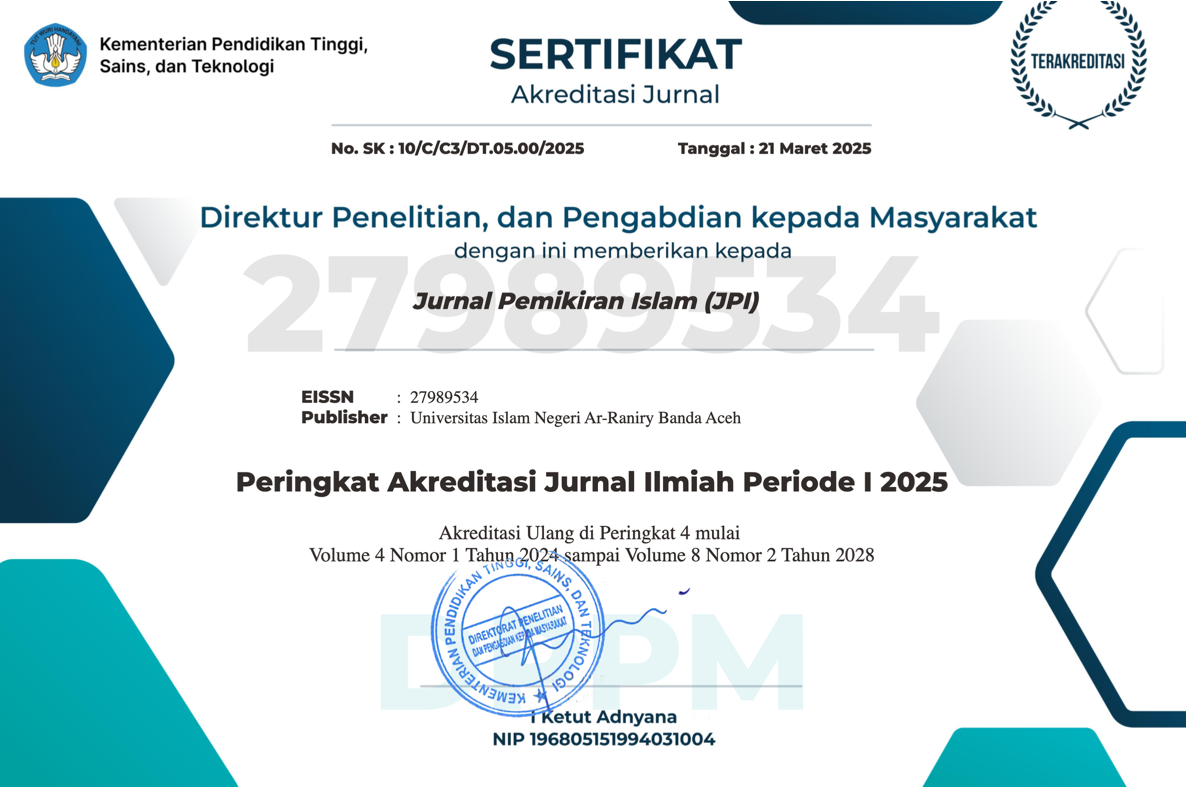Dinamika Intelektual dan Peradaban Islam pada Masa Rasulullah
DOI:
https://doi.org/10.22373/jpi.v2i1.12527Keywords:
Muhammad, Pemikiran, PeradabanAbstract
The role of the Prophet Muhammad in spreading the teachings of Islam not only influenced the dynamics of the rule of law (shari'ah) but also the formation of world civilization. This article will explain the role of Rasulullah in building civilization and intellect in the Islamic world. This study is a literature review using a descriptive analysis method with a qualitative approach. This research concludes that Muhammad saw. has succeeded in changing the civilization of the Arabs into a more civilized nation. In terms of thought, the Prophet Muhammad was the center of all Islamic teachings in the process of the early formation of Islamic society. The existence of the Prophet is the only human being who has the authority to justify the thought of Islamic law in that society.
Abstrak
Peran Rasulullah Muhammad saw dalam menyebarkan ajaran Islam tidak hanya memberikan pengaruh pada dinamika aturan hukum (syari’at) an sich, melainkan memberikan pengaruh terhadap pembentukan peradaban dunia yang berjalan beriringan. Artikel ini akan mengetengahkan sejauh mana peran Rasulullah dalam membangun peradaban dan intelektualitas dunia Islam. Kajian ini sebuah kajian kepustakaan dengan menggunakan metode deskriptif analisis dengan pendekatan kualitatif. Dari Kajian yang dilakukan ditemukan bahwa: Dari sudut pandang peradaban, Muhammad saw telah berhasil mengubah peradaban bangsa Arab dengan segala kompleksitas persoalan sosialnya menjadi bangsa yang lebih beradab. Sementara dari sudut pandang pemikiran, Rasulullah saw adalah pusat dari segala ajaran Islam yang pada masa itu sedang dalam proses pembentukan awal. Keberadaan Rasulullah merupakan satu-satunya manusia yang memiliki otoritas untuk memberikan justifikasi terhadap pemikiran hukum Islam, meskipun dalam lingkup yang sangat kecil memungkinkan bagi sahabat tertentu untuk melakukan ijtihad.
Downloads
References
Abdul al-Wahab al-Khallaf. (1978). Khulashah Tarikhi al-Tasyri’ al-Islami. Dar al-Qalam.
Abdul Karim Zaidan, al-W. (1996). Ushul al-Fiqh. ar-Risalah Publishing House.
Abdurrahman Kasdi. (2015). Genealogi dan Sejarah Perkembangan Politik Islam. Addin, Vol 9 No 2.
Ahmad Hasan. (1984). Pintu Ijtihad Sebelum Tertutup. Pustaka.
Albi Anggito, J. S. (2018). Metodologi Penelitian Kualitatif. Jejak.
Asfi Manzilati. (2017). Metodologi Penelitian Kualitatif. Universitas Brawijaya Press.
Hasjim Abbas. (2004). Kritik Matan Hadits: Versi Muhaditsin dan Fuqaha. Teras.
Heri Firmansyah. (2019). MUHAMMAD SAW PADA PERIODE MEKAH. T-TAFKIR: Jurnal Pendidikan, Hukum Dan Sosial Keagamaan, Vol 12 No. https://doi.org/https://doi.org/10.32505/at.v12i1.806
Muhammad Sa’eed Ramadhan Albuthi. (1993). Fiqh al Siirah Muhammad SAW. Dar al-Fikr.
Muhammad Yamin. (2017a). Peradaban Islam Pada Masa Nabi Muhammad SAW. Ihya Al-‘arabiyah Jurnal Pendidikan Bahasa Dan Sasrta Arab, Vol 3 No 1.
Muhammad Yamin. (2017b). Peradaban Islam Pada Masa Nabi Muhammad SAW. Jurnal Ihya Al-‘Arabiyah, Vol 3 No 1.
Nasroen Haroen. (1996). Ushul Fiqih Jilid I (Logos (Ed.)).
Shafiyyurrahman al-Mubarakfuri. (1997). Al-Rahiq Al-Makhtum; Bahtsun fi As-Sirah An-Nabawiyah, alih bahasa Kathur Suhardi. Pustaka Al-Kautsar.
Vigih Hery Kristanto. (2018). Metodologi penelitian. Deepublish.
W. Montgomery Watt. (1961). Muhammad Prophet and Statesman. Oxford University Press.
Downloads
Published
Issue
Section
License
Authors who publish in Jurnal Pemikiran Islam agree to the following terms:
- Authors retain copyright and grant the journal right of first publication with the work simultaneously licensed Attribution-NonCommercial-ShareAlike 4.0 International (CC BY-NC-SA 4.0) that allows others to share the work with an acknowledgment of the work's authorship and initial publication in this journal.
- Authors are able to enter into separate, additional contractual arrangements for the non-exclusive distribution of the journal's published version of the work (e.g., post it to an institutional repository or publish it in a book), with an acknowledgment of its initial publication in this journal.
- Authors are permitted and encouraged to post their work online (e.g., in institutional repositories or on their website) prior to and during the submission process, as it can lead to productive exchanges, as well as earlier and greater citation of published work. (See The Effect of Open Acces)














